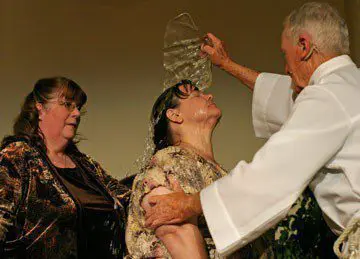 Order of Christian Initiation:
Order of Christian Initiation:
Baptism, Confirmation, and Eucharist: How We Welcome New Members into the Church
Every society, if it hopes to survive and thrive, must find ways to welcome and form new members. This is true of sports leagues, universities, labor unions, nations, and churches. In some groups, joining may be as simple as filling out a form and sending in a payment. At the other extreme, many traditional cultures—such as those depicted in Roots—have used complex and deeply symbolic rites to mark the passage into adulthood.
The seriousness of an initiation process—how long it takes, how much reflection and effort it involves—reveals something profound about how deeply the group values its identity and the commitment of its members. The Catholic Church is no exception. Our way of welcoming new members is deliberate and meaningful because the life we are inviting them into is sacred, communal, and lifelong.
Like an engagement before marriage, the Church’s initiation process involves mutual discernment. The individual gets to know the Church, and the Church comes to know the individual. Over time, through shared prayer, teaching, and experience, both come to a deeper understanding of one another. The rites we use to initiate adults have been shaped by centuries of tradition and experience. They are not arbitrary; they have stood the test of time.
In recent decades, the Catholic Church has renewed and rediscovered its ancient process of adult initiation. The structure we follow today—called the Order of Christian Initiation of Adults (OCIA)—is rooted in the practices of the early Church, when adult converts were the norm.
The Journey of Initiation
The OCIA process typically unfolds over the course of a year or more. It begins with a time of inquiry, when a person begins asking questions, hearing the Gospel, and exploring the possibility of faith. This is a time of seeking—not a race to the finish line.
If the person feels called to take the next step, they enter the catechumenate, a formal period of learning and spiritual formation. Catechumens belong to the Church in a real but not-yet-complete way. They are formed through teaching, community life, participation in the liturgy of the Word, and most importantly, through personal relationships with catechists and fellow parishioners. This stage can last several months or even years, depending on each individual’s journey.
When the catechumen and the parish community together discern that the time is right, the person takes part in the Rite of Election, typically at the beginning of Lent. From this point forward, they are known as “the elect”—those chosen and called by God to receive the sacraments of initiation.
Lent becomes a period of purification and enlightenment, marked by special rites during Sunday Masses known as scrutinies, in which the Church prays that the elect may be freed from sin and grow in holiness.
Then, during the great celebration of the Easter Vigil, the elect are baptized, confirmed, and receive the Eucharist for the first time. This night marks the beginning of their full life in the Church.
The journey doesn’t end there. During the 50 days of the Easter season, the newly initiated continue to meet, reflect, and learn as part of a period called mystagogy, in which the Church helps them deepen their understanding of the sacraments they’ve received and integrate fully into the life of the Christian community.
A Community’s Responsibility
All of this happens within the context of liturgy—the Church’s living prayer. Through the prayers, rituals, and celebrations, the Church expresses itself to the candidates and is, in turn, renewed by their presence. The liturgy reveals what’s real: a Church learning Christ anew through those who are seeking Him.
Adult initiation is far more than a brief sacramental ceremony. It is a relationship. It is a journey of faith, supported by the love, witness, and commitment of a living community. Without that communal dimension, the sacraments lose their context. Faith is not passed on by books alone, but by people—by the Church, alive and present.
At the heart of OCIA is a deep and genuine welcome. The Church opens her arms to receive those seeking Christ and embraces them fully into her life.
If you or someone you know would like to begin this journey at Holy Family, we warmly invite you to contact:
Dawn Ponnet
📧 dponnet@holyfamily.org
📞 626.403.6128
